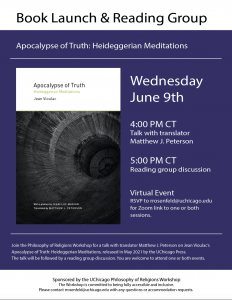Ryan S. Bingham
PhD Student, Religion, Literature, and Visual Culture
The Critics of Metaphysics and the Power of their Judgment
Part II: Heidegger and Derrida
At the outset of his critical project, Immanuel Kant describes his age as “the genuine age of criticism,” claiming that the “power of judgment” belonging to this age calls for the institution of a peculiar “court of justice”: namely, “the critique of pure reason itself.” Among the critiques of his age, this critique was to have the power to decide “the possibility or impossibility of a metaphysics in general,” which is “the culmination of all culture of human reason.” This critique, demanded by the age’s power of judgment, reached its third and final stage in the critique of the “power of judgment” itself. What did this critique grant to the “power of judgment,” and what judgments concerning metaphysics did it thus make possible? When inheritors of the Kantian critical project have made critique of the power of judgment integral to their own attempt at a critique of metaphysics, what judgments have they made concerning the power of judgment, and how has this immanent critique of critique affected the project of a critique of metaphysics? In this two-part essay, I first situate the critique of the power of judgment within the Kantian critical project, specifically attending to its importance to Kant’s effort to decisively ground a metaphysics. I then attend to the tradition of the critique of the power of judgment as part of a critique of metaphysics on the part of Martin Heidegger and Jacques Derrida. I argue that the critique of the power of judgment comes to serve as a site for the critique of critique itself. For Heidegger, from the mid-1920s to the mid-1930s, this critique entails the uncovering of what is “unthought” in Kant’s transcendental idealism for the sake of either an essential grounding of metaphysics or an overcoming of metaphysics toward his “other beginning.” For Derrida, however, this critique entails the detection of cultural prejudices (e.g., Platonic, Christian, German) as these inform the critique of metaphysics itself in Kant and Heidegger. Far from either pretending to a lack of prejudice or abandoning the critical project, Derrida’s pursuit of the critique of the power of judgment as a critique of the critique of metaphysics promotes renewed critical attention to cultural prejudices, including, notably, those of the critic. Derrida thus uniquely alters the task of criticism.
The paper may be accessed here.
Tuesday, March 9th, 12:30 PM
Hosted by the Philosophy of Religions Workshop at the University of Chicago. To RSVP and receive a Zoom link and password for the paper, please email Rebekah Rosenfeld (rrosenfeld@uchicago.edu).
The Workshop on the Philosophy of Religions is committed to being a fully accessible and inclusive workshop. Please contact Workshop Coordinators Rebekah Rosenfeld (rrosenfeld@uchicago.edu) or Tyler Neenan (tjneenan@uchicago.edu) in order to make any arrangements necessary to facilitate your participation in workshop events.




